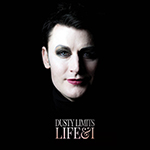Christy Simmons
When Life Gives You Lemons
Blue Strawberry, St. Louis, MO, January 9, 2020
Reviewed by Chuck Lavazzi for Cabaret Scenes

The press material for When Life Gives You Lemons called it “an irreverent romp through the peaks and valleys of the dating game.” Which, as it turns out, was a pretty accurate description.
Honesty compels me to point out that Christy Simmons and I are not strangers. The local cabaret scene is not large, and I know almost everyone in it. But I also know great acting and singing when I see it, and I certainly saw plenty of it in this show.
With a set list of 17 numbers, When Life Gives You Lemons was a bit long for a traditional one-act cabaret. But they were all great songs, ranging from vaudeville-era numbers to Burt Bacharach and Hal David’s “What’s New, Pussycat?” Simmons delivered them with that combination of vocal authority, canny theatricality, and sassy attitude that has become her trademark.
The evening was all about making romantic “lemons” into lemonade or, preferably, a lemon-drop martini. Simmons had a basket of actual lemons on stage, each of which was labeled with a code name of the guy in question (The Englishman, The Comic, and so on). As she brought each one out, the sometimes-convoluted story of the failed relationships fed into the next set of songs.
It was a whimsical concept, one well received by the audience.
Before the specifics, though, the show opened with a couple of songs on the general theme of “what the hell was I thinking,” starting with a jazzy romp through Duke Ellington and Luther Henderson’s “Love You Madly” followed by Cy Coleman/Dorothy Fields’ “Nobody Does It Like Me” (from the 1973 musical Seesaw). Accompanist Joe Dreyer—a familiar face on the local music scene—had a solid extended solo in the first number; the overall result was to start the evening off with a bang.
The story of lemon number 1, The Englishman, was next. Describing him as her “first love,” Simmons confessed that what really sold her on him was the way he reminded her of Peter Sellers. That led to “What’s New Pussycat?” (the theme song from a Sellers film) done in the swaggering style of the singer who first recorded it, Tom Jones. That was followed by Jerry Leiber and Mike Stoller’s “Trouble” (sung by Elvis Presley in the 1958 movie King Creole). She introduced that one with a bit of advice that would prove to be a major romantic lesson for her: “When a man tells you he’s a scoundrel, believe him.”
And so it went, with recurring appearances of The Englishman, along with tales of the movie-star handsome Chef (“I traded Peter Sellers for Dudley Do-Right”), the Frenchman with whom she had a brief fling in Paris, The Comic (“a great boyfriend” but ultimately feckless), and The Internet Date (“he was average; VERY average”), represented not by a three-dimensional lemon but a one-dimensional drawing of one. That led to a rarely heard Irving Berlin novelty, “Mr. Monotony,” written as a solo for Judy Garland in the 1948 film Easter Parade but cut from the final release.
A standout moment for me was the incredible but true story of how Simmons and The Chef, who were both living in Los Angeles at the time, auditioned together (without success) for the ringmaster role in the Ringling Brothers Barnum and Bailey Circus. They auditioned with a routine built on the obscure 1912 vaudeville number “Oh You Circus Day” (introduced, according to the sheet music, by “Montgomery and Moore in Lew Fields’s Hanky Panky“). Her performance did full justice to its fanciful word play and ragtime rhythms.
Percy Mayfield’s “Hit the Road, Jack” (a big hit for Ray Charles in 1961) was great fun, with the audience encouraged to take the role of The Raelettes. It was refreshing to hear Henri Betti and Andre’ Hornez’s “C’est Si Bon” in the original French, and Lionel Hampton and Sonny Burke’s “Midnight Sun,” with its vivid and slightly surreal lyrics by Johnny Mercer, got a sensitive performance, filled with smoky regret.
So, yeah, the musical side of When Life Gives You Lemons was a massive success. Less successful were the many “lemon” anecdotes that connected those great song performances. Some went on far too long, sometimes dropping off the “too much information” cliff and telling us far more than we needed to know in order to set up the next number. What the show needs at this point is a director who could suggest cuts in both the patter and the song list that would bring it down from its current 105-minute length to the 65 to 75 minutes that’s more customary for a solo evening. The old “less is more” saw is often a good rule in cabaret.
The evening closed with a joyful version of a song that has always been one of my favorites, “Ac-Cent-Tchu-Ate the Positive ” by Harold Arlen and Mercer. The refrain has advice appropriate for these politically dark times: “You’ve got to accentuate the positive/Eliminate the negative/And latch on to the affirmative/Don’t mess with Mister In-Between.” Or, as Simmons noted, “you can’t control what life gives you, but you can control how you respond to it.”
True, that.
Shows continue at Blue Strawberry, St. Louis’s only dedicated bar/restaurant/cabaret showroom. Check its web site at bluestrawberrystl.com for details.





